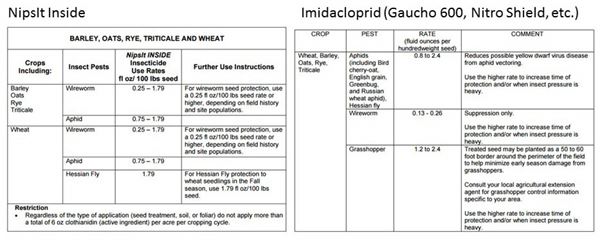Wheat Insecticide Seed Treatments: Are You Getting What You Thought?
DR. SCOTT STEWART
JACKSON, TENN.
In wheat, rates of insecticides labeled for seed treatment vary considerably. Gaucho 600, NipsIt Inside, and Cruiser are recommended at rates of about 0.8 – 1.3 oz of product per hundred weight of seed when used for the control of aphids (and better protection from the barley yellow dwarf virus they transmit). My experience is that local providers are using rates in the range of 0.8 to 1.0 oz. This is within the rate range recommended on the label for aphid control, although of the low end. However, the labels for these products allow for higher rates AND much lower rates for the control of other pests (wireworms). Seed treatment packages with low insecticide rates, and including fungicides, are often marketed in the Midwest where aphids and BYDV are not a big threat.
I’ve included a couple of representative labels for insecticide seed treatments in wheat. My point … someone can say your wheat is treated with “Cruiser” (thiamethoxam), “Gaucho” (imidacloprid), or “NipsIt “(clothianidin), but that tells you little about the rate that was applied. With Gaucho, for example, it could be as low as 0.13 oz per hundred weight or as high as 2.4 oz.
The bag tags do not usually specify the rate of insecticide that was applied, so you are putting a lot of faith that you are getting a rate recommended for aphid control. The real take home point is to ask what insecticide AND what rate is being applied to your seed. In my opinion, there is little value in applying an insecticide treatment unless you are using a rate at or above the minimum recommended for aphid control.
This article should have been written a few weeks ago, but it still may have some value for some. I previously wrote a similar article if you want more information. (http://news.utcrops.com/2014/10/insecticide-seed-treatments-in-wheat-know-what-youre-buying/). If not using an insecticide seed treatment, foliar insecticide application(s) are a viable option. ∆
DR. SCOTT STEWART: IPM Extension Specialist, University of Tennessee
